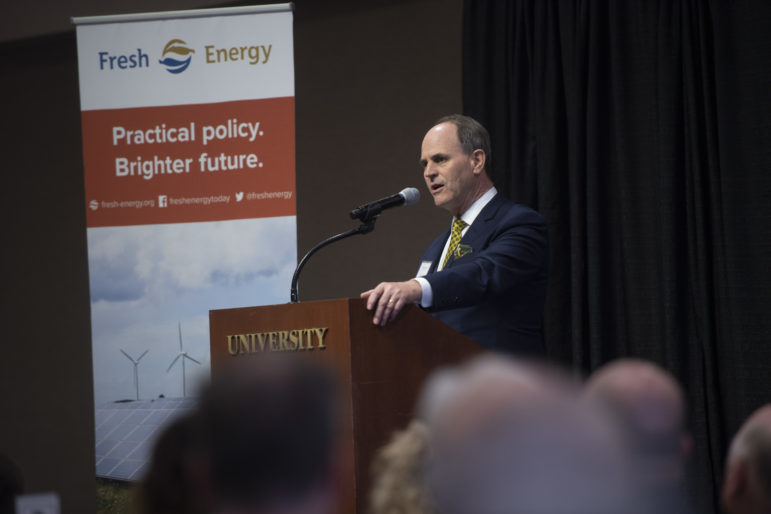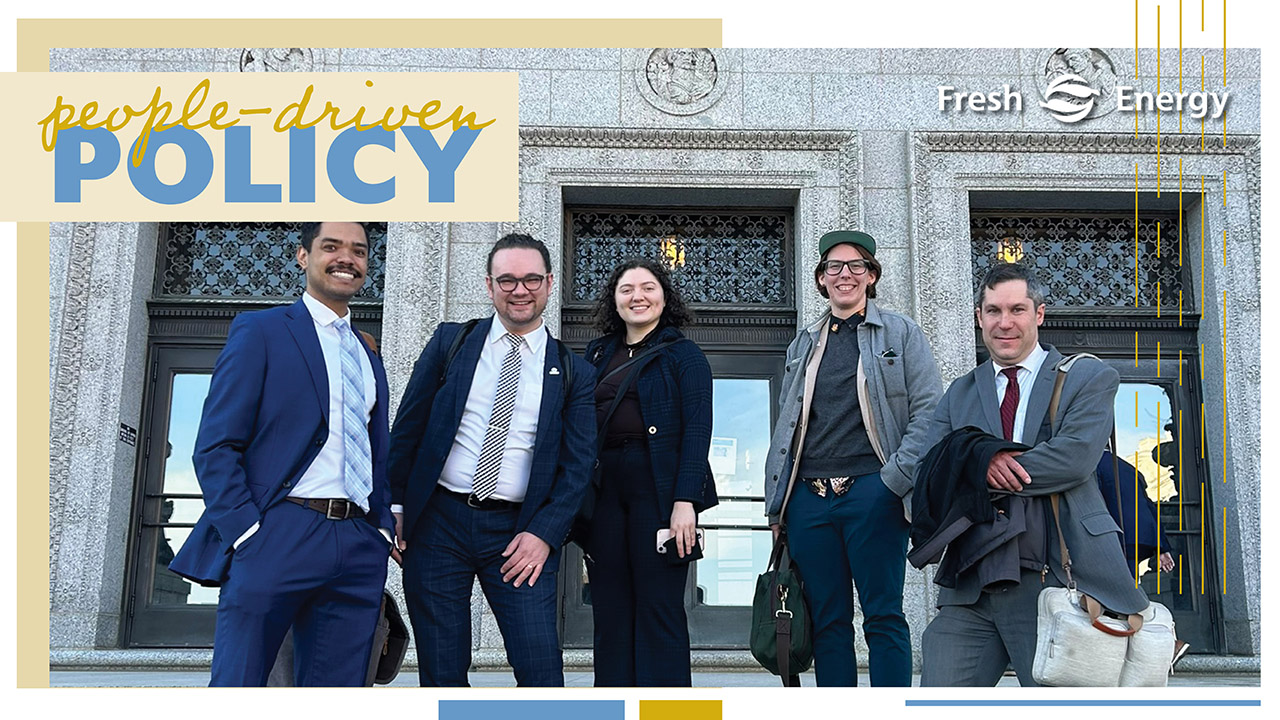
On October 3, 2018, Fresh Energy hosted our third annual benefit breakfast at the University of Saint Thomas. Chair Mary Nichols, one of America’s most influential public officials and chair of the California Air Resources gave the keynote speech, followed by executive director, Michael Noble. Below is a transcript of his speech.
Thank you so much, Chair Mary Nichols. We are all inspired by what’s been accomplished in California, and your clear-eyed path forward.
Just a few years ago, it would have been unimaginable that the world’s fifth largest economy would make the commitments your legislature and governor have made.
Minnesota hasn’t put a stake in the ground to go emission free, but with your high bar now, we will engage conversations about that same ambition.
Fresh Energy’s 3-part strategy is not unlike yours:
- Make everything as efficient as it can be;
- Completely cut carbon emissions from electric supply;
- Steadily work to electrify everything we can that now runs on oil and gas.
Getting very deep carbon reductions in our electricity supply is gaining rapid momentum.
We are steadily cutting carbon there, meeting our renewable electricity standard eight years before it was due.
In renewable energy, I think we can call ourselves the Bold North, because the upper Midwest electric grid is actually ahead of California’s: of all the electricity generated in 2017 in our region, we were about one third wind and solar, and the California grid was about one quarter.
If we can come together as Minnesotans, we could have 60 percent wind and solar by 2030 for all Minnesota utilities, like California has just committed.
If we include more options for zero emission electricity, we are ready to raise the bar and engage the debate about 100% clean electricity by 2045, like California has just committed.
If we aggressively work to switch oil and gas dependence to clean electricity, we can go 100% carbon neutral like California has just committed.
As Fresh Energy accelerates momentum to 100 percent clean electricity, we need to move ahead boldly toward using it to power transportation and heat our homes and buildings.
Minnesota is very dependent on oil with fewer than 1 percent of new cars running on electricity. But a tipping point is coming fast. In California and China right now more than 5 percent of all cars sold come with an electric plug, up from 1 percent just a couple years ago. Analysts now predict that by 2020 90 percent of Norway’s car sales will be electric. That’s a massive carbon reduction and an enormous improvement in air quality.
On auto emissions and fuel economy, Minnesota faces a choice: we can go backwards along with Federal Government, as this Administration works to gut the fuel economy standards the auto industry agreed to a decade ago.
Or we can move forward, joining California and a dozen other states with cleaner cars, saving money and reducing air pollution. We should accelerate sales of electric vehicles by joining the clean cars states with requirements for sales of vehicles with zero emissions. If we are as ambitious as California on electric cars, we would shoot for a million by 2030, every one replacing a polluting gasoline vehicle.
Many friends here know that my wife Patsy and I have been on a journey to find the plug-in electric station wagon that matches the needs of our one car family. We haul stuff for gardening and we do wilderness camping and long distance travel. We think we found the right one, a crossover SUV that EPA rates as equal to 105 miles per gallon, and that Xcel can fill up with wind power at night for the equivalent of 60 cents a gallon. Unfortunately, there’s only 1 of them on any car lot within 250 miles of Saint Paul right now.
That’s because most manufacturers send almost all their electric cars to states that have policies to spur sales of electric cars. Many new models are coming over the next couple years. But if manufacturers only offer them in states with clean car policies, most Americans won’t see these models at car dealers near their home. So that’s one thing that Minnesota can definitely do: become a clean car state, and fight the federal rollbacks shoulder to shoulder with a dozen other states, and under Chair Nichols’s leadership.
Switching our bus system to switch to electric buses is underway, and as you can imagine, eliminating noisy and smelly diesel buses will have a huge benefit to public health and quality of life in our cities.
Just last week, Metro Transit cancelled an Request for Proposal for 131 diesel buses, and announced a new direction with electric buses.
Whether you’re waiting on the bus stop or sitting at a sidewalk café, you will cheer when the buses run on 100 percent renewable electricity, silently and pollution free!
Getting fossil fuels out of our buildings is another area Fresh Energy is pushing forward.
Making new residential construction all-electric and carbon-free is becoming practical and economic. There’s no reason we can’t build new homes so efficient that they can be heated and cooled with heat pumps powered by small amounts of renewable electricity, instead of boilers and furnaces and air conditioners.
In new developments like the Ford site right here in Highland Park, we are cheering on our friends the Ryan Companies, who are here today. These new buildings can be so energy efficient that this can be a state-of-the-art energy model, a biking and walking mecca, strongly connected to transit, a net zero neighborhood without fossil fuels.
As an organization that works entirely in the public interest, our staff and our board all recognize it’s our job to put a bold vision out there: Minnesota can commit to be a more prosperous and more equitable place, while going beyond fossil fuels, getting to a carbon neutral economy within 25 years.
What makes me feel good at the end of long week is to think about how our work improves people’s lives. Whether it’s catalyzing new industries like community solar and the jobs it creates; whether its revitalizing rural communities with renewable energy; or helping families make their apartment buildings more efficient and affordable, we do this work to make a difference.
My promise to you is this: Practical and economic carbon reduction strategies and public policies, and a big 100 percent vision for our future.

